Have you ever wondered “Is my unsecured collection collectable?”
“Is this past due, unsecured account even collectable?” It’s a common question in the minds of credit professionals. I wish I had a Magic 8 Ball that would always say “YES! Yes, it IS collectable!” with every anxious shake, unfortunately the responses in my Magic 8 Ball are varied and there is no guarantee it will land on “YES!” every time. When determining the collectability of an account, there are several factors that should be taken into consideration.
I mean, as fun & entertaining as the Magic 8 Ball can be, I feel I should remind you that it’s not the best way to determine the collectability of a past due account.
Yes, unsecured collections can be more difficult to collect than secured collections (i.e. past due accounts secured by a UCC filing, mechanic’s lien or bond claim), though you shouldn’t abandon all hope when an unsecured past due receivable hits your desk. When you are evaluating the collectability of account, specifically one that is unsecured, we recommend you use the following questions as a guide to help you determine the likelihood of a successful collection.
How Old Is the Receivable?
How many days past due is this account? 30? 90? 180? It’s no secret: the longer an account remains unpaid the harder it becomes to collect. In fact, studies indicate, after six months, the collectability of a past due account may be reduced to 52%.
Do You Have Documentation?
Do you have thorough, accurate and up-to-date documentation? This could include a contract or purchase order, current credit application, statement of account, open invoices, communications between you and your customer, bounced checks, the dates of received payments etc. The more documentation you have to support your claim, the more leverage it can provide to a collector, and more leverage may mean a more likely collection.
Also, obtaining personal guarantees provides additional leverage because it holds the principal(s) of the debtor corporation personally responsible for the debt.
Is Your Customer Still in Business?
Though it may seem fairly obvious, it’s worth noting. If your customer is no longer in operation, it does make the collection more difficult – not necessarily impossible. Take the time to confirm their corporate registration with the Secretary of State is active and in good standing or even drive by their place of business to see if it is vacant.
Does Your Customer Have Assets?
Knowing what, if any, assets your customer has may provide you additional leverage – for example, you may discover additional assets which could give more power to a settlement offer. If you want to know what assets are available, you may find some of these tools helpful:
- Skip Trace
- Asset Search
- Credit Report
- Property Owner Search
- Vehicle Search
- Public Record Search
Is Your Customer in other Collection Litigation, Judgments or Bankruptcy?
Understand that if your customer has several past due accounts with multiple creditors, it could reduce the likelihood of you recouping payment. Of course, if your customer has filed for bankruptcy protection, collection efforts must cease, though you can file a proof of claim with the courts.
C’Mon Magic 8 Ball!
There is no winning formula for determining the collectability of a past due receivable. Make sure you weigh the costs against the potential recovery – and make sure you take steps to secure future receivables!


